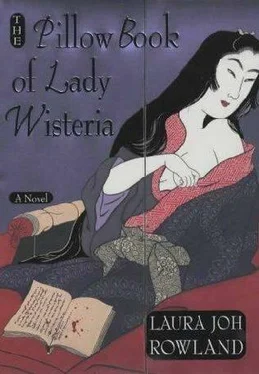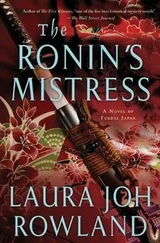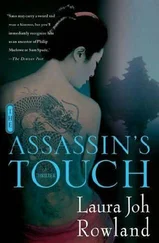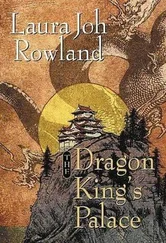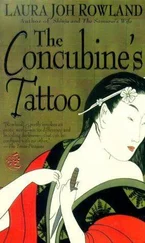Stifling an impulse to rage at them, Sano mustered his self-control. He said to the shogun, “That Police Commissioner Hoshina has demonstrated an association between Lady Wisteria and me isn’t proof that I’m a murderer or traitor.”
“That the sōsakan-sama attempted to conceal the association indicates that he’s guilty,” Hoshina said quickly.
Sano turned on his foe. “Just when does the book say I plotted against His Excellency and Lord Mitsuyoshi? Or is the story as vague about dates as it is untrue?”
Caution narrowed Hoshina’s eyes. “Lady Wisteria marked the date as Genroku Year Five, the seventh month, on the night of the full moon.”
“You mean you did. When you wrote the book, you made the mistake of specifying an exact time. My wife will swear that I was with her that night,” Sano said.
“I certainly did not write the book. And the wife of a liar is no more honest than he,” Hoshina scoffed. “Everyone knows Lady Reiko is very fond of her husband and would do or say anything to protect him. She’s an untrustworthy witness.”
“Do you have any witness at all who can confirm that I said the things in the book?” Sano demanded.
“Your Excellency, the only witness to his statements was Lady Wisteria, who’s been murdered. Her body was discovered the night before last.” The crime hadn’t escaped the notice of Hoshina and his spies. “How convenient for the sōsakan-sama that she can’t speak against him.” Hoshina flashed a sardonic glance at Sano.
“The body may not even be Wisteria,” Sano said, “and it was found in a house belonging to Fujio the hokan. He’s the primary suspect in that murder, and also in Lord Mitsuyoshi’s. There are other suspects, including Wisteria’s chaperone, and maybe more we don’t know about because the investigation isn’t finished.”
“The investigation has been controlled by the sōsakan-sama from the start,” Hoshina said with disdain. “The suspects he mentions are only people who can’t prove their innocence. He persecuted them to shield himself.”
“You were the one who arrested Momoko,” Sano pointed out.
“Because he tricked me into it,” Hoshina told the shogun. “He even defended Treasury Minister Nitta at his trial to make everyone believe he cares about justice. But his investigation is a farce, and his good character a disguise.
“Lady Wisteria wrote in her pillow book that she wanted to force the sōsakan-sama to marry her. He gave her the weapon she needed when he insulted Your Excellency and threatened Lord Mitsuyoshi. It’s obvious that Wisteria tried to blackmail the sōsakan-sama, and he killed her so she could never tell anyone what he’d said. He’s a traitor who killed once to place his son in line for the succession, and again to cover up his crime.”
“Indeed.” Tokugawa Tsunayoshi glowered at Sano.
Sano felt the escalating pulse of panic along his nerves. Whatever he said in his own defense, Hoshina twisted to make him appear guiltier. Terrified by the nightmare that enmeshed him, furious at Hoshina, the elders, the shogun, and the injustice he faced, Sano resorted to guile, his only means of survival.
“Your Excellency,” Sano said, “please allow me to remind everyone here that you are the ultimate authority. Your wisdom and powers of judgment surpass those of lesser humans. Police Commissioner Hoshina owes you an apology for trying to impose his feeble opinions on you.”
Dismay wiped the self-satisfaction off Hoshina’s face. “He’s trying to flatter you into thinking better of him and worse of me, Your Excellency.”
But the shogun, clearly eager for praise, frowned in resentment at Hoshina and waved a hand to silence him. “Go on,” Tokugawa Tsunayoshi ordered Sano.
“You are a judicious ruler with a unique ability to distinguish right from wrong. Would you condemn a man just because a mere subordinate said you should?” Sano went on, though ashamed of manipulating his lord. “Would you let the real killer go free because Hoshina-san wants me blamed for Lord Mitsuyoshi’s murder?”
While Hoshina stared in helpless outrage, indecision creased the shogun’s brow. “I, ahh, guess not,” the shogun said, looking to Sano for approval.
“Of course you wouldn’t.” Heartened that he’d gained the upper hand, Sano said, “Your strong sense of honor requires more than just a book of dubious origin and Hoshina-san’s accusations before you decide whether a man you’ve trusted is a criminal. You require facts.”
“Facts. Ahh, yes.” The shogun seized upon the word, as though delighted to see a complex situation reduced to one simple idea. Then his face clouded with confusion. “But how do I get them? What, ahh, shall I do?”
“Since you ask my humble opinion,” Sano said, “I suggest that you order me to continue investigating the murders until I find the real culprit and prove my claim that I am innocent and have been framed by my enemies.”
Enlightenment cleared the confusion from the shogun’s face; but before he could speak, Hoshina said, “Please excuse me, Your Excellency, but the sōsakan-sama mustn’t be allowed to search out an innocent person to blame for his crimes.” Hoshina’s tone was fervent, desperate. “If you agree to what he asks, you’ll be abetting the man who killed your cousin!”
“In the interest of fairness, Police Commissioner Hoshina should be permitted to look for evidence that I’m guilty,” Sano said.
Hoshina’s mouth opened in incredulity. The shogun considered. He looked toward Chamberlain Yanagisawa, whose shoulders moved in a slight shrug that disclaimed responsibility for the decision. The shogun then turned to the elders, but they sat still and impassive, like trees motionless until the prevailing wind blows.
At last Tokugawa Tsunayoshi nodded. “That sounds, ahh, reasonable,” he said. The elders also nodded, their heads moving in unison.
Sano experienced a deluge of relief that didn’t quench his rage at everyone in the room. He’d won a chance to save himself, but it was far less than he deserved.
Indignant, Hoshina turned to Yanagisawa. The chamberlain looked straight at Sano. Was that respect, and a gleam of amusement in Yanagisawa’s eyes? Sano had learned from the chamberlain’s example how to manipulate the shogun. Did Yanagisawa enjoy watching Sano stoop to his own level?
Sano suddenly understood why Yanagisawa didn’t care who had killed Lord Mitsuyoshi-or if the killer was caught-and chose to stay out of the argument. Yanagisawa had his mind on the future rather than the immediate controversy.
Tokugawa Tsunayoshi flapped a hand at Sano and Hoshina. “I, ahh, order you both to go and do what Sōsakan Sano suggested. But remember this.” He focused his bloodshot eyes on Hoshina. “If you fail to prove that Sano-san is guilty, you will be punished for, ahh, slandering him.” The shogun’s warning gaze moved to Sano. “And unless you prove your innocence, you will be executed for killing my heir.”
A large, noisy crowd filled the courtyard of Magistrate Aoki’s mansion and overflowed into the street. Hirata, accompanied by three detectives, had to push his way through the gate. People jostled him, craning their necks toward the mansion. Some were young men whose raffish clothing marked them as entertainers, artists, hustlers, or other denizens of the fashionable low life, but most were women.
Samurai ladies, dressed in silk and guarded by troops, clustered around an iron vat, where a fire had been lit to heat the courtyard. In the outer reaches of the fire’s warmth, nuns with shaven heads knelt chanting prayers. Beyond them stood gaudily dressed wives and daughters of merchants. The largest contingent, huddled against the wall and buildings, looked to be servants, teahouse girls, and disreputable females. Some of the women wept; others whispered together, clearly distraught. Several doshin kept order among the crowd.
Читать дальше
